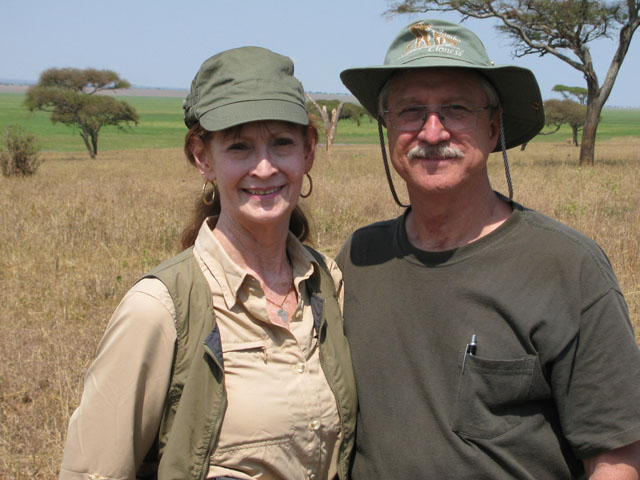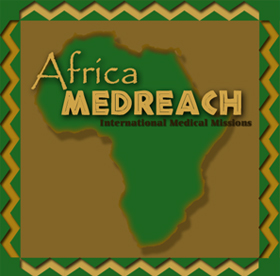About MedReach, Inc.
 MedReach is a non-denomination faith-based ministry that organizes and leads short term medical evangelism teams to East Africa. We are official partners while in country with Here’s Life Africa (HLA), which supports 50 Jesus Film teams of nationals in Tanzania, Uganda and Malawi since 1997. MedReach is a non-denomination faith-based ministry that organizes and leads short term medical evangelism teams to East Africa. We are official partners while in country with Here’s Life Africa (HLA), which supports 50 Jesus Film teams of nationals in Tanzania, Uganda and Malawi since 1997.
Evangelical and Medical Missions to East Africa have been led by Steve and SL Hudson and embedded with HLA Jesus Film Teams since 2002.
Analysis of Scope of Mission to the BUSH:
MedReach recruits, trains, organizes and leads short-term medical mission to the bush of East Africa.
The standard trip requires a sixteen (16) day commitment from US city back to US city. There are 12-day trips, and also a shortened 12-day option as a member of the 16-day team.
Two (2) days travel to Africa and two (2) days back.
Hotel accommodations first and last nights, and two nights at mid mission while on sight-seeing safari.
Target two (2) villages in the bush where access to medical care and the Gospel are limited. The teams sleep in tents, cook their own food, dig pits for toilets, and use bottled water only. There will be no electricity, no running water, no paved roads, no cars or trucks.
Four (4) days of set up, medical clinic, and all other mission activities in first village.
Two (2) days on sight seeing safari to a national park with hotel accommodations and exotic African animals in the wild.
Three (3) days in second village to repeat all work done in first village.
First and second Base Camps consist of:
Medical Clinic: Three-day non-sterile medical clinic in vacant school rooms. Average 400 patients per day treated. No screening by race, religion or creed. All are welcome and given equal care. Patients line up early and throughout the day to register. Their first stop is triage where US nurses are in charge with African nurses and non-skilled help assisting patients. Next to the exam room. Both US and African doctors are conducting exams. Then to the pharmacy where donated, US purchased, and locally purchased medicines are dispensed. Thirty day supplies are the longest duration of meds, but with many conditions such as malnutrition, malaria, skin diseases, eye, ear and nose infections, and worms, treatments yield rapid results. AIDS testing, counseling and information regarding locations for treatment may soon be offered. Malaria is the number one killer in Africa and the vast majority of its victims are children 5 and under.
Advantages of using school facilities: 1) Schools are centrally located by governments to accommodate students and teachers traveling on foot. 2) Teachers are usually available and are great help for interpreting and child discipline. 3) School Masters are available and wonderful bridges to the community. 4) School rooms offer security and separation from the crowds. 5) School rooms offer space for clinic’s triage, examinations, pharmacy, children’s bible teaching, pastor’s conference, kitchen, early morning devotion and information, evangelism and bible distribution. 6) Security for stored meds, equipment, bibles and literature, food and water, and other camp supplies. 7) Are well known to populations for easy directions to clinic. 8) Usually have some tables, chairs and desk for use by team. 9) Are often on a road. 10) Normally have an open playground that can be used to set up the tent city.
Evangelism: The Gospel is presented clearly to all who go through our clinic and desire to hear. When available in the local language, New Testaments and literature of Campus Crusade is given to all who make decisions. US team members accompany HLA Jesus Film Team leaders each day at dusk to two (2) or three (3) even more remote locations to show the Jesus Film and an AIDS education film. A unique aspect of this mission is the constant personal interaction with African nationals. It is a joy to work closely with these enthusiastic young, spirit-filled Jesus Film leaders, many of whom are pastors. They inspire US teams with their love for Jesus and their resourcefulness in conducting a difficult bush ministry.
Hut-to-Hut Evangelism: A daily team will go out on rural walks from hut to hut inviting people to the daily clinic, children’s ministry, and nightly film shows, sharing Christ to men and women of peace as they go.
Distribution of reading and sun glasses: Being close to the equator, cataracts are common even with younger people. Sunglasses have a medical benefit. Of course, to give reading glasses yielding immediate results of clear sight is quite rewarding for both the giver and receiver.
Children’s Ministry: Organized daily activities with the 100 to 300 kids are exhilarating and offer rare teaching opportunities for those so inclined. Because we operate in elementary school facilities, kids who are out of school know well how to find their way to hear our teaching and participate in the activities we plan for them.
Pastor Conference: Most African pastors are young men in their late 20’s to late 30’s. The average life span in East Africa is only 45 years. The young pastors most commonly have only a bible passed down from their fathers. Their congregations have no bibles, and in fact, have no books or paper of any kind in their huts. These pastors are in love with Jesus but have little or no formal training, with few opportunities or financial resources to ever be trained. They esteem US pastors and teachers who are well trained and steeped in biblical knowledge, and are eager to learn from them. They will sit and listen as long as anybody will teach them. Spiritual hunger is evident. Upon completion of the conference, each pastor is given a concordance and study bible if available in the local language.
Ladies Hygiene: Ladies are offered education and encouragement regarding health care, personal hygiene, and family planning. Biblical principals for child rearing and marriage are taught. In African rural societies women are seldom given special attention or “pampered”. Classes may include foot washing and pedicures, or gift packets prepared by women in the states who want to be a part of the mission.
Food preparation: Both US and African kitchens are operated. The typical US team of 25 to 30, and the associated African support team of around 30, has to be fed 2 or 3 meals a day. This takes lots of planning and on-site work, but is necessary for a medical evangelism team to serve in remote areas. A ton of bottled water along with several tons of other camping supplies and mission personnel make logistics a challenge while traversing substandard dirt roadways and sometime trails.
How can I help? We are glad you asked! You can be a part of this ministry by praying, giving, and going.
1. We need doctors, nurses, dentists, pharmacists, eye care specialists for our medical clinics. However, people from all walks of life are able to work very productively assisting patients to more easily process through the clinic. Anybody can take temperatures, weigh and measure. Our pharmacists supervise, but most meds are dispensed by laymen. We need cooks, camp masters, children’s teachers and workers, evangelist, bible teachers, pastors and ladies hygiene
teachers and workers. Anyone can find a place to serve well on a MedReach mission team.
Donated new and used eyeglasses are matched to users often by laymen.
2. We always need funds for medicines and bibles, and scholarships for people to go and serve. Please see our Website donations page at www.MedReachInc.org.
Come and Join us!
Steve and SL Hudson, Medical Missions Directors for MedReach, Inc.
PO Box 9875 Mobile, AL. 36691
(251) 666-2539
MedReach@gmail.com |
